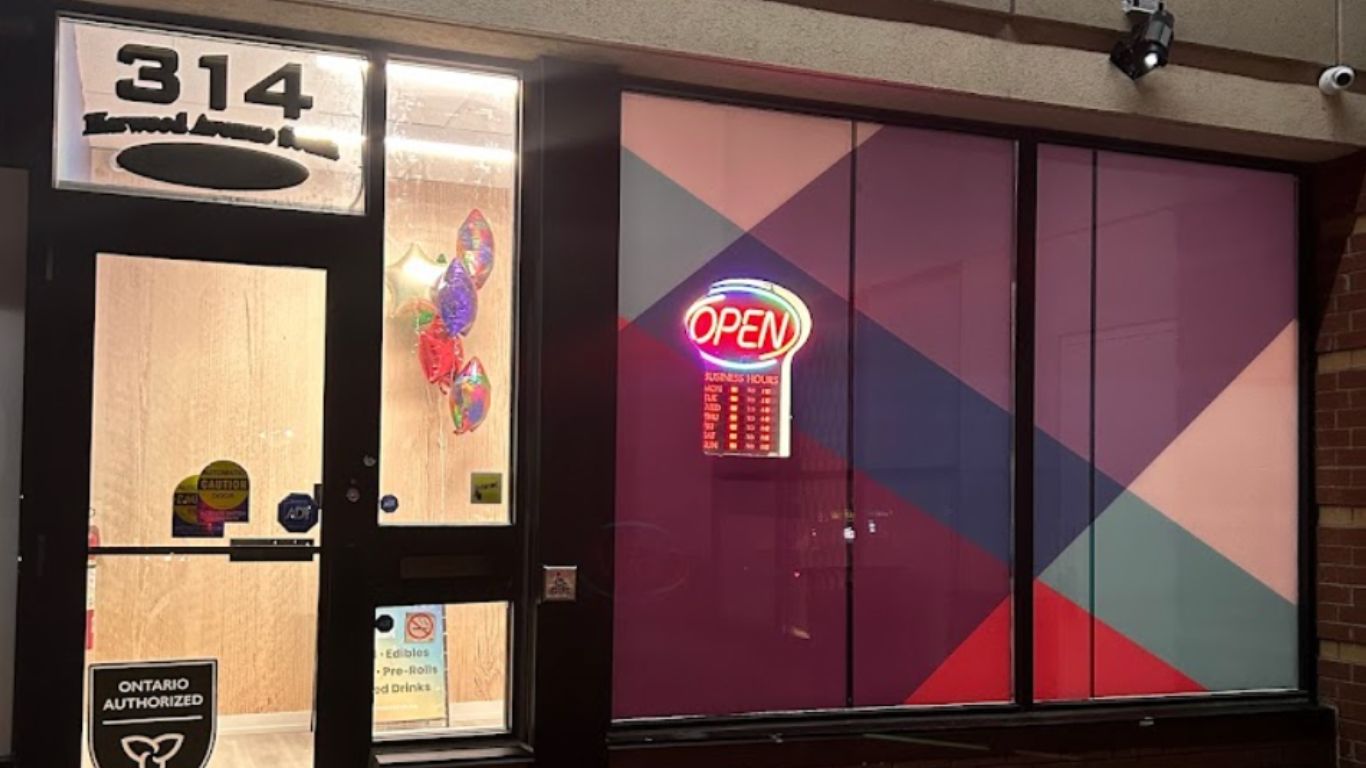
by Grow Up Conference | Nov 12, 2024 | Media Partners, Stratcann
The Cronos Group reported USD$34.3 million in net revenue, $3.6 million in gross profit, and $7.3 million in net income in its third quarter 2024 report for the three months ended September 30, 2024 (all figures in USD).
This represented a significant year-over-year increase in net revenue and income for the cannabis producer, with a 38% increase of $9.5 million from the three months ended September 30, 2023. Cronos attributes this to an increase in sales domestically and in the international market.
However, gross profit was down 9% year-over-year, representing a decrease of $0.4 million from the third quarter in 2023. Cronos attributes this loss mainly to inventory-related purchase accounting adjustments resulting from the Cronos GrowCo transaction on July 1, 2024. This loss was also somewhat offset by higher cannabis flower and extract sales in the Canadian market, higher cannabis flower sales in Israel, and higher cannabis flower sales in other countries.
The bulk of Crono’s cannabis sales are in Canada and Israel. For the three months ending September 30, 2024, $26.3 million of those sales were for cannabis flower, while $7.8 million were for cannabis extracts. From those sales, $24.1 was in Canada’s medical and non-medical cannabis market, $7.3 million was in Israel, and $2.9 million was from sales in other countries.
Cronos also recently announced a $51 million (CAD$70 million) expansion of Cronos Growing Company Inc. (Cronos GrowCo) to address increased international demand for its cannabis. Cronos GrowCo reported preliminary unaudited net revenue to third parties, excluding sales to the Company, of approximately $2.7 million in the second quarter of 2024. Q3 2024 represents the first quarter where Cronos consolidates Cronos GrowCo’s results in its financial statements.
The company’s adjusted gross profit in Q3 2024 was a 170% increase from the same quarter in 2023.
“Our results this quarter demonstrate that our long-term strategy is working,” said Mike Gorenstein, Cronos chairman, president and CEO. “With record net revenue and a disciplined approach to operating expenses, Cronos operates more efficiently and effectively than ever before, and we anticipate long-term margin improvement.
“Our consolidation of Cronos Growing Company has further strengthened our supply chain, which we anticipate will lead to improved margins and allow us to meet the increasing global demand for high-quality cannabis. With an industry-leading balance sheet, we are well-positioned to expand into new legal markets and drive future growth opportunities.
“As international demand continues to rise, particularly in markets like Germany, the UK, and Australia, the investments we’ve made in our infrastructure and global partnerships are paying off.”
In Q3 2024, Cronos brand Spinach was the top-selling cannabis brand in Canada, according to Hifyre. The brand’s edibles were in the number one position with a 17.2% market share in Q3 2024, while its flower products held the number one spot with a 6% market share.
In September, Cronos joined a group of cannabis cultivators that had filed an administrative petition in the District Court of Jerusalem, Israel, against the Trade Levies Commissioner and certain Israeli and Canadian businesses in relation to the Israeli government’s concerns about “product dumping” into their domestic market from Canadian cannabis companies.
The Israeli government had proposed a levy on Canadian cannabis products, which could be as high as 369% on Cronos products. In their most recent quarterly report, Coronos says that on November 10, 2024, Israel’s Trade Levies Commissioner published final findings under which Cronos would be subject to a proposed duty of 175%, pending a ruling from an advisory committee.
Related Articles

by Grow Up Conference | Nov 12, 2024 | Garden Culture Magazine, Media Partners
We hear many references to the “gut microbiome” lately. Thanks in large part to the work of fermentation enthusiasts, there has been a cultural turn toward cultivating healthy “microherds” of beneficial organisms within our bodies. Without necessarily realizing it, we’ve fundamentally changed our perception of ourselves as animal creatures. Modern scientific methods and technologies confirm and reveal the interconnectedness, even inextricability, of each of us with other species in our physical space.


We are constantly exposed to an immeasurable diversity of microbial life. Studies weave knowledge about mental and emotional wellness, neurological function, stress tolerance, and nervous system regulation with examinations of bacteria and yeasts inside and on our bodies (1). We are becoming more aware of the human-as-holobiont.
Greater than the sum of its parts: what is a holobiont?
If the microbiome may be described as an “assemblage of communities” of microorganisms (2), a holobiont is the “supraorganism” formed by a centralized individual and this “hosted” population.


The choice of “who gets in” isn’t always within control, as in the case of viruses against which no previously developed immunity exists. However, with intention, we can work toward providing a supportive microbiome, creating the conditions for swift, well-resourced, and decisive responses.
Coevolution through natural selection has guided the development of plant genetics that reach new heights of yield and environmental resilience when allowed to play with their full deck. This transformative perspective will enable us to conceptualize our cultivated plants as holobionts.
Why view plants as holobionts instead of individuals of a single species in a community with other organisms?
Only in the most strictly managed laboratory setting (reserved for propagation by tissue culture) is it desirable to pursue conditions approaching sterility.
Yet, we are rightly concerned about the advantageous growth of soil fungi that negatively impact young plant material, causing damp-off. We worry about transmitting viruses and other pathogens, especially those which have thrived and proliferated in our growing spaces.
Maintaining a clean growing environment, observing closely, and responding to issues with interventions or procedure changes is good practice. While this does work, it can lead to treating symptoms, not causes.
When we envision each plant as a holobiont, we acknowledge that while the general functions of the immune system and metabolism are encoded in the DNA of the plant, the effectiveness and health of those systems are highly reliant on microorganisms, some of which have coevolved and are highly specialized to the plant.
Incredibly, even in sanitized substrates and when controlled for exposure by air currents and through fertigation, the microbiomes of young plants can be rich with life. The seeds introduce diverse bacteria and fungi to the microbiome (3). These species are ‘vertically’ transmitted, from generation to generation, instead of being obtained ‘horizontally’ through the external environment. Vertically transmitted microbes are often among the most beneficial.


Seedlings and newly struck cuttings are busy establishing their root systems and leaves to acquire nutrition, gain energy and develop structures needed to be buoyant in life’s coming waves. It can be helpful to encourage the horizontal transmission of known beneficial microbes after reducing the number of possible encounters with powerful antagonists.
Cuttings come with microbiomes thriving in and on the aerial parts of the donor plant. Depending on the assessed health of those mothers, it is a judgment call as to whether there is more reason to dip and strip these surface microbes to eliminate the transfer risk of spores and other potential threats to a plant without its vibrant root microbiome.
Economies of space and resources and regulatory guidelines shape decisions about optimizing and prioritizing the needs of targeted holobionts within an ecosystem. Certain products are disallowed as sprays within a certain pre-harvest period for consumer protection, and environmental health is considered when it comes to the allowable application of nutrients, other agricultural amendments, and pest-management products.
Thankfully, data-supported evidence is being accumulated to demonstrate the real value of attending to the health of plant microbiomes. Where possible, allowing a population of diverse holobionts to coexist (e.g., in succession gardening and intercropping) favors the meetings of mutually beneficial organisms. This, in turn, has demonstrable economic relevance.
Who can add known beneficials to their grow?
Just as live food cultures are easily found in grocery stores, like apple cider vinegar “with the mother”, microbial inoculants have become commonplace in garden centres and grow stores. Any grower who can purchase pre-made soil mixes or fertilizers may now experiment with products certified to contain measurable amounts of beneficial bacteria and fungi.
Following the producers’ instructions is essential. There is no reason to believe that “more is better”; the plants will select those with which they work best, and these will increase under favorable conditions.
It is a good idea to consider plants’ changing needs as they grow: demands on their microbiomes will change in character and intensity. Just like “veg” and “bloom” nutrient mixes, it is not uncommon to see products designed with those same general life stages in mind. Others may contain a mix of species that will be ‘assembled’ and proliferate on or within the plant according to its needs as it develops.
In commercial settings, it is handy (or necessary) to reference the list of well-researched, specially selected and bred beneficial bacteria and fungi in purchased products. Many have been certified for use in organic production.
How to work with plants as holobionts varies according to growing style.
As the main diversity of species in a unique plant’s root microbiome is horizontally assembled in the soil, it is crucial to consider the traits of your chosen growing medium.
Living soil growers and regenerative land stewards are familiar with various ways to acquire, support, and multiply diverse populations of beneficial microbes, making them available to plants via their root zones. Some of these include brewing Actively Aerated Compost Teas (AACTs), collecting and propagating Indigenous Microorganisms (IMOs), and using no-till,’ chop and drop’, and intercropping (companion planting). Soil specialists are building capacity in agricultural networks, and you can consult with one or take courses yourself to gain from this holistic school of thought.
In these growing systems, the plant holobionts are generally given as much opportunity as possible to select and assemble their constituent populations of bacteria and fungi. When a singular species dominates an agricultural space, as in the case of monocropping, especially where genetically identical plants are grown, the preferences of that particular holobiont type reduce microbial diversity in areas under its strong influence.
Controlled environment growers using soilless mediums must take a different approach to ensure the continued availability and population balance of certain microbial populations. Often, these growers may have several subtypes of a commercially important species (for example, cannabis) under cultivation, and these also demonstrate variance within their microbiomes. Research suggests this is guided by the genetic favoring of certain partner microbes for producing target phytochemicals (e.g., THC, CBD, terpenes)(4).
Once acquired, aspects of a holobiont found within plant structures, as opposed to on the surfaces, may be less impacted by the ebb and flow of water in a hydroponic system. Ensuring the cleanliness of fertigation infrastructure (drip systems, especially recirculating ones) requires balancing the regular use of antimicrobial agents (like hydrochlorous acid and hydrogen peroxide) with their effects on the holobiont’s wellness.


Re-populate beneficials for different plant life stage requirements at regular intervals. At transplant, and upon altering lighting schedules or nutrient regimens, it’s a good strategy to ‘top up’ the diversity of available microbes so the plant can accumulate more of what will best serve them at that time.
In an intensively managed system where there are no insects to crawl up from the dirt, hop from leaf to leaf, or buzz about to sample nectar, a good argument can be made for misting or fogging with microbiome-supporting solutions, especially where seeds are being produced for future plantings. Instructions for appropriately cleaning plant parts designated for consumption before storage and use will be part of this protocol.
Strike a balance between allowing beneficials to thrive and not completely excluding or eliminating exposure to challenges. Various stressors enable plants to produce immune responses to maximize the production of commercially-valued secondary metabolites. Some other phytochemicals (plant-serving molecules but helpful to humans) contribute to post-harvest storage capacity and nutritional value. Since energy is always being used to power these processes, consider supplementation a means to keep the plant from having to manufacture this energy itself and use it to maintain its microbiomes.
Forward Thinking
Crop monocultures becoming extremely vulnerable to a particular disease has been historically explained by their loss of ability to “fight off” a unique, unfamiliar attacker. Shifting perspective to these crop plants as holobionts, we can understand better how disease resistance can become a function not only of supporting the immunity of plants within their lifetimes but also considering the inheritance of beneficial microbes and their co-evolutionary relationship with the genetics of the socially valued species.
Advancements in DNA research technologies and revelations of how microbial interactions with individuals influence the expression of specific genes, are exposing even greater complexity. More than ever before, we can explore the downstream, heritable impacts of plant microbiome wellness on domesticated plant species. Revisioning crop plants as invaluable co-stewards of the land makes it possible for guided, intentional, and more harmonious co-existence with unseen populations.
References:
(1) ncbi.nlm.nih.gov/pmc/articles/PMC5581153/pdf/oncotarget-08-53829.pdf
(2) dx.doi.org/10.1016/j.mib.2017.07.001
(3) doi: 10.3389/fmicb.2021.737616
(4) doi: 10.3389/fmicb.2020.00491

by Grow Up Conference | Nov 12, 2024 | Extraction Magazine, Media Partners
The use of dyes for artistic, social, and religious purposes has been found in every human society since prehistoric times. Nowadays, color still plays a crucial role in the market success of a product. Furthermore, in nature, brightly-colored plants are often poisonous, inedible, and thus avoided by animals. In the same way, color is a visual parameter of food acceptability for humans and can determine the expectation of a pleasant or unpleasant taste. [1] An extensive record exists of prehistoric use of ochre and black pigments obtained by natural rocks and other geological components.
Later societies developed their way to obtain other colors from different sources. Egyptians used to make blue pigment from lapis lazuli. In 500 BC, in China Han Blue was developed from mineral sources, whereas Maya Blue was a mixture of minerals and Indigofera suffruticosa’s leaves. Among organic dyes stands out Tyrian purple, a purple pigment widely produced and commercialized by Phoenicians that was obtained from species of snails Murex brandaris and Murex trunculus. [2]
From the second half of the 19th century, the dying process was marked by a crucial turning point, the introduction of synthetic colorants on the market. The reason for their immediate success was their capacity to dye fabrics such as silk and resist thermal and light degradation and washing. From that moment on many other coal-derived dyes were commercialized and at the turn of the century these unmonitored additives spread throughout the USA and European countries in various foods, such as ketchup, mustard, jellies, and wines. However, soon after their diffusion, the awareness of these colorants’ toxicity spread out and a long journey towards international regulation began. [2]
Nowadays, there is increasing mistrust of synthetic dyes and the attention is moving towards natural ones. However, the extraction of natural pigments has its drawbacks, including cost and environmental impact. The main characteristics, classification, advantages, and disadvantages will be analyzed for both synthetic and natural dyes, exploring the principal sources of the latter. [1], [3]
Synthetic Dyes and Their Regulation
The history of synthetic dyes began with the patent of the dye “Mauvaine” by Henry Perkin in 1856. From that moment on a plethora of synthetic dyes was commercialized. The first ones were aniline-derived compounds obtained from coal. Nowadays synthetic colorants are characterized by a huge variety of structures and auxochromes. Both natural and synthetic colorants are divided into the following classes: azo, anthraquinone, triphenylmethane, nitro and nitroso, indigoid, xanthene, acridine, and phthalein. The main reasons for synthetic colorants’ success are:
- their stability over time,
- being inert to physical, chemical, and biological degradation,
- reproducibility of dyeing process,
- low cost.
The main sectors of their application are the textile, tanning, cosmetic, and food industries.[2] Azo dyes account for 60% of the total use of synthetic dyes due to their low cost, high intensity, and color fastness. Anthraquinones are the second most frequently used dyes due to their accessibility whereas indigoid and triphenylmethane are the most common in the textile industry. [2], [4]
Synthetic colorants’ success has been strongly reduced over the years due to the rapid discovery of toxic effects both on the environment and human health. Regarding environmental pollution, synthetic colorants tend to accumulate in wastewater. Indeed, 20% of the colorants used in the textile industry doesn’t fix on the fiber and disperses into water.
The side effects of these colorants being very stable is that they are also inert and thus recalcitrant, in particular the saturated compounds. They are not only carcinogenic, but increase environmental parameters such as chemical oxygen demand (COD), and they tend to biomagnify, generating high contamination rates at high levels of the trophic chain. [2]
Regarding food colorants, the legislation deeply varies from country to country. The strictest country on synthetic food dyes is India, which allows only 8 of them, followed by the USA and China. EU and Brazil allow a higher amount of artificial colors compared to other countries, but the main difference is that the EU carries out much more frequent reevaluation of authorized dyes than Brazil. The Joint FAO/WHO Expert Committee on Food Additives is the international scientific committee responsible for assessing the risks associated with the consumption of additives and setting an adequate daily intake (ADI) value. [4], [3]
The main health concerns are on azo dyes, due to their reduction to potentially carcinogenic aromatic amines by the azoreductases present in the intestinal bacteria. Data also show the toxic effects of the triphenylmethane group on metabolic activity. Furthermore, this compound absorption rapidly reaches the bloodstream.
A factor that enhanced public mistrust of food colorants is their highly toxic effects on children. [5] Indeed, not only their ADI value is lower due to their lower body weight, but they are also more likely to be exposed to food colorants that are usually contained in food such as sweets and lollipops that are mainly consumed by younger generations. [4], [6]
Natural Hues and Pigment Extraction
Current FDA regulations classify two types of colorants: certified and exempt from certification. This second category generally includes natural pigments, but no legal definition for the term natural has yet been adopted, leading to consumer and industrial confusion. Natural pigments often carry more limitations than synthetic colorants for coloring food.
They are less stable, they are not able to completely match the color characteristics of synthetic hue, and their production often involves a larger amount of raw material and higher production costs than their synthetic counterparts. However, the increasing success of natural colorants is the fact that, contrary to synthetic ones, they are not only safe, but they add beneficial characteristics to food and they can be categorized as nutraceuticals. [1], [7]
Flavonoid Derivatives
Are a group of secondary plant metabolites characterized by a C6C3C6 carbon skeletal backbone. Among these compounds, anthocyanins enclose the most important group of water-soluble pigments. [1] They are responsible for the colors of vegetables such as blueberries, blackberries, purple cabbage, haskap, etc. [7]
They differ from one another for the methoxylation and hydroxylation degree, in nature they are bound to sugars and can be further acylated with aromatic or aliphatic acids. Acylated and non-acylated anthocyanins differ in their stability and the brightness of the hue. Acylated anthocyanins are common in vegetal and floral systems, while non-acylated ones are predominant in fruits.[1]
Anthocyanins are pH-labile, at low pH values they are used as red colorants whereas in alkaline conditions their color turns to purple/blue and they are less stable towards temperature and light. Traditionally, they have been extracted using solid-liquid extraction with acidified organic polar solvents.
More modern methodologies for anthocyanin recovery are extraction with supercritical fluids (SFE) and extraction with pressurized liquids (), as they operate with low temperatures and short extraction times, avoiding the degradation of thermolabile secondary metabolites and allowing the use of non-toxic economic solvents. [7], [8]
Carotenoids
Are isoprenoid derivatives widely distributed in nature, including higher plants, bacteria, fungi, yeast, birds, and insects. They are 40-carbon tetraterpenoids that are divided into carotenes (only polyunsaturated hydrocarbons) and xanthophylls (contain oxygen atoms). These lipid-soluble compounds display colors ranging from yellow to orange to red. Increasing the conjugation system results in redder hues. [1], [7] Lycopene is a typical red natural colorant, found in tomato, watermelon, guava, and pink fruit.
Annatto is a pigment extracted from the tropical tree Bixa aurellana that is commonly used as a yellow colorant. Two pigments are responsible for the hue: bixin, a lipid-soluble carotenoid-type compound, and its saponified form, norbixin, which can be extracted with alkali solution and is thus water-soluble, which represents a major advantage compared to the other carotenoid, whose lipid solubility represents a limitation for industrial applications.[1] Traditionally, carotenoids are extracted with polar (xanthophylls) and apolar (carotenes) organic solvents.
However, the use of novel extraction techniques as alternatives to conventional extraction methods offers several advantages, from extraction efficiency to being environmentally friendly. Among these, ultrasound-assisted extraction (UAE) and extraction with supercritical CO2 are the most frequently used alternatives to traditional extraction. [7], [8]
Chlorophylls
Are symmetric cyclic tetrapyrroles and are present in every photosynthetic organism. They are found in nature with a phytol attachment and centralized magnesium ion. Chlorophylls’ typical color is green, but its tone can vary after extraction. Indeed, chlorophylls are deputed for photosynthesis and plants’ metabolic activity. Being catalysts, these compounds are intrinsically unstable and lose their green color very quickly.
They can be stabilized with cations such as Cu2+ or Zn2+. [1] Extraction of this class of compounds is realized through maceration and traditional extraction with polar organic solvents and sometimes with ultrasound-assisted extraction with organic solvents. This last technique allows to reduce extraction times. Since chlorophylls’ polarity range is wide, attention must be paid during the chromatography purification step, for which reversed-phase columns (C18 and C30) are the preferred stationary phase. [7]
Betalains
Are N-heterocyclic immonium derivatives derived from betalamic acid. They are mainly found in red beet and cactus pear and consist of red and yellow pigment. They are stable over a wide range of pH, but they are prone to light and temperature degradation which is why they are used as dyes in frozen products. Traditional extraction methods are characterized by higher extraction times and temperatures, which carry the risk of betalains degradation. [9] An innovative non-thermal method that reported good extraction yields is pulsed electric field-assisted extraction. Furthermore, betalains can be stabilized using additives such as antioxidants (e.g. ascorbic acid), chelating agents (EDTA, citric acid), preservatives and gums (e.g. pectin, locust bean gum). [1], [9]
Other Classes of Dies
Other important and widely used natural dyes do not belong to any of the above-mentioned classes. Carminic acid, found in cochineal insects from the superfamily Coccoidea, whose color varies from orange to purple increasing the pH value. Crocin, obtained from Saffron, the dried stigma of Crocus sativus flower, is authorized as a yellow-orange food colorant in the US, but not in the European Union where it’s considered a spice. Curcumin, demethoxycurcumin, and bisdemethoxycurcumin are yellow pigments contained in turmeric, a yellow spice from the rhizomes of the herb Curcuma longa.
Despite the prevalence of green hues in natural settings, cool natural dyes are hard to obtain. Apart from chlorophylls, other pigments in the blue-green range of tonalities are phycocyanins, protein-pigment complexes obtained from the cyanobacteria A. platensis, better known as spirulina. However, its use is limited by its poor light stability and sensitivity to heat, and this bright blue-colored compound is mainly used as an ice-cream colorant. [1]
Conclusions
Natural pigments are still characterized by many limitations to substitute synthetic dyes in all of their several applications. However, a coin always has two sides. On one side natural dyes production costs and wastes are still too high to be competitive, on the other both synthetic dyes and and their production wastes are recalcitrant and toxic for health and environment. [2], [4]
Especially in food industry, natural pigments are not only required by consumers because of their believed safety, but they could also improve the nutraceutical value of food thanks to their many biological activities (e.g. antimicrobial, anticancer, cardioprotective activities). On the other hand, natural pigment might confer unpleasant tastes to food as in the case of betalains obtained from red beet. [3], [7]
Undoubtedly, the ambiguity of the legislation on natural dyes strongly disfavors them compared to synthetic colorants. [1] Efforts have to be made both to increase natural pigments regulation and improve their production methods, making them real alternatives to synthetic colorants. The food industry has already set off to a conversion to more natural products, but it is worth asking whether the textile industry should do the same, considering it is the first industry sector for colorant dispersion into wastewater. [2]
References:
[1] G. T. Sigurdson, P. Tang, and M. M. Giusti, “Natural Colorants: Food Colorants from Natural Sources” , 2017, Annual Reviews Inc. doi: 10.1146/annurev-food-030216-025923.
[2] L. D. Ardila-Leal, R. A. Poutou-Piñales, A. M. Pedroza-Rodríguez, and B. E. Quevedo-Hidalgo, “A brief history of colour, the environmental impact of synthetic dyes and removal by using laccases” 2021, MDPI AG. doi: 10.3390/molecules26133813.
[3] A. Burrows, “Palette of our palates: A brief history of food coloring and its regulation” 2009. doi: 10.1111/j.1541-4337.2009.00089.x.
[4] I. G. C. Mota, R. A. M. Das Neves, S. S. D. C. Nascimento, B. L. L. Maciel, A. H. D. A. Morais, and T. S. Passos, “Artificial Dyes: Health Risks and the Need for Revision of International Regulations” 2023, Taylor and Francis Ltd. doi: 10.1080/87559129.2021.1934694.
[5] J. Huff, M. F. Jacobson, and D. L. Davis, “The limits of two-year bioassay exposure regimens for identifying chemical carcinogens” 2008. doi: 10.1289/ehp.10716.
[6] M. Lucová, J. Hojerová, S. PaŽoureková, and Z. Klimová, “Absorption of triphenylmethane dyes Brilliant Blue and Patent Blue through intact skin, shaven skin and lingual mucosa from daily life products”, 2013, Food and Chemical Toxicology, 52, pp. 19–27. doi: 10.1016/j.fct.2012.10.027.
[7] A. K. Molina, R. C. G. Corrêa, M. A. Prieto, C. Pereira, and L. Barros, “Bioactive Natural Pigments’ Extraction, Isolation, and Stability in Food Applications”, 2023, MDPI. doi: 10.3390/molecules28031200.
[8] I. Karimi Sani et al., “Pulsed electric field-assisted extraction of natural colorants; principles and applications,” Oct. 01, 2024, Elsevier Ltd. doi: 10.1016/j.fbio.2024.104746.
[9] R. N. Arshad et al., “Pulsed electric field: A potential alternative towards a sustainable food processing,” , 2021, Trends Food Sci Technol, vol. 111, pp. 43–54. doi: 10.1016/J.TIFS.2021.02.041.

by Grow Up Conference | Nov 12, 2024 | Grow Opportunity, Media Partners
(Globe Newswire) Toronto – Cronos Group Inc. today announced its 2024 third quarter business results.
“Our results this quarter demonstrate that our long-term strategy is working. With record net revenue and a disciplined approach to operating expenses, Cronos operates more efficiently and effectively than ever before, and we anticipate long-term margin improvement. Our consolidation of Cronos Growing Company has further strengthened our supply chain, which we anticipate will lead to improved margins and allow us to meet the increasing global demand for high-quality cannabis. With an industry-leading balance sheet, we are well-positioned to expand into new legal markets and drive future growth opportunities,” said Mike Gorenstein, Chairman, President and CEO, Cronos.
“As international demand continues to rise, particularly in markets like Germany, the UK, and Australia, the investments we’ve made in our infrastructure and global partnerships are paying off,” continued Mr. Gorenstein. “In the third quarter, our award-winning Spinach® brand rose to become the best-selling cannabis brand in the Canadian adult-use market and our Peace Naturals® brand held a top spot in the Israeli medical market. Our brands’ market share out-performance represents our relentless commitment to quality, innovation, and bringing differentiated products to the global cannabis market. The progress we’ve made reinforces our leadership in key categories and markets, and we remain focused on continuing to innovate and bring premium products to consumers.”
1 Hifyre Retail Analytics – National Retail Dollar Sales by Brand in Canada – August 2024.
Consolidated Financial Results
On June 20, 2024 the Company made an additional investment in Cronos Growing Company (” Cronos GrowCo”) to fund the expansion of cultivation operations. Cronos also obtained majority control of the board of directors of Cronos GrowCo and began consolidating Cronos GrowCo’s results as of July 1, 2024. Prior to this date, the Company’s investment in Cronos GrowCo consisted of an investment accounted for under the equity method and loans receivable from Cronos GrowCo.
In the second quarter of 2023, the Company exited its U.S. hemp-derived CBD operations. The exit of the U.S. operations represented a strategic shift, and as such, qualifies for reporting as discontinued operations in the condensed consolidated statements of net income (loss) and comprehensive income (loss). Prior period amounts have been reclassified to reflect the discontinued operations classification of the U.S. operations.
The tables below set forth our condensed consolidated results of continuing operations, expressed in thousands of U.S. dollars for the periods presented. Our condensed consolidated financial results for these periods are not necessarily indicative of the consolidated financial results that we will achieve in future periods.
| (in thousands of USD) |
|
Three months ended September 30, |
|
Change |
|
Nine months ended September 30, |
|
Change |
|
|
|
2024 |
|
|
|
2023 |
|
|
$ |
|
% |
|
|
2024 |
|
|
|
2023 |
|
|
$ |
|
% |
| Cronos net revenue, excluding Cronos GrowCo net revenue(i) |
|
$ |
29,996 |
|
|
$ |
24,810 |
|
|
$ |
5,186 |
|
|
21 |
% |
|
$ |
83,046 |
|
|
$ |
63,326 |
|
|
$ |
19,720 |
|
|
31 |
% |
| Cronos GrowCo net revenue(ii) |
|
|
4,268 |
|
|
|
— |
|
|
|
4,268 |
|
|
N/A |
|
|
4,268 |
|
|
|
— |
|
|
|
4,268 |
|
|
N/A |
| Net revenue |
|
$ |
34,264 |
|
|
$ |
24,810 |
|
|
$ |
9,454 |
|
|
38 |
% |
|
$ |
87,314 |
|
|
$ |
63,326 |
|
|
$ |
23,988 |
|
|
38 |
% |
|
|
|
|
|
|
|
|
|
|
|
|
|
|
|
|
|
| Cost of sales |
|
|
30,341 |
|
|
|
20,124 |
|
|
|
10,217 |
|
|
51 |
% |
|
|
72,216 |
|
|
|
52,614 |
|
|
|
19,602 |
|
|
37 |
% |
| Inventory write-down |
|
|
312 |
|
|
|
716 |
|
|
|
(404 |
) |
|
(56 |
)% |
|
|
707 |
|
|
|
716 |
|
|
|
(9 |
) |
|
(1 |
)% |
| Gross profit |
|
$ |
3,611 |
|
|
$ |
3,970 |
|
|
$ |
(359 |
) |
|
(9 |
)% |
|
$ |
14,391 |
|
|
$ |
9,996 |
|
|
$ |
4,395 |
|
|
44 |
% |
| Gross margin(iii) |
|
|
11 |
% |
|
|
16 |
% |
|
N/A |
|
(5) pp |
|
|
16 |
% |
|
|
16 |
% |
|
N/A |
|
—pp |
|
|
|
|
|
|
|
|
|
|
|
|
|
|
|
|
|
| Inventory step-up recorded to cost of sales |
|
|
7,116 |
|
|
|
— |
|
|
|
7,116 |
|
|
N/A |
|
|
7,116 |
|
|
|
— |
|
|
|
7,116 |
|
|
N/A |
| Adjusted Gross Profit(iv) |
|
$ |
10,727 |
|
|
$ |
3,970 |
|
|
$ |
6,757 |
|
|
170 |
% |
|
$ |
21,507 |
|
|
$ |
9,996 |
|
|
$ |
11,511 |
|
|
115 |
% |
| Adjusted Gross Margin(v) |
|
|
31 |
% |
|
|
16 |
% |
|
N/A |
|
15pp |
|
|
25 |
% |
|
|
16 |
% |
|
N/A |
|
9pp |
|
|
|
|
|
|
|
|
|
|
|
|
|
|
|
|
|
| Net income (loss) |
|
$ |
7,324 |
|
|
$ |
(1,590 |
) |
|
$ |
8,914 |
|
|
N/M |
|
$ |
(3,919 |
) |
|
$ |
(25,288 |
) |
|
$ |
21,369 |
|
|
85 |
% |
|
|
|
|
|
|
|
|
|
|
|
|
|
|
|
|
|
| Adjusted EBITDA(iv) |
|
$ |
(6,019 |
) |
|
$ |
(15,187 |
) |
|
$ |
9,168 |
|
|
60 |
% |
|
$ |
(27,739 |
) |
|
$ |
(46,774 |
) |
|
$ |
19,035 |
|
|
41 |
% |
|
|
|
|
|
|
|
|
|
|
|
|
|
|
|
|
|
| Other Data |
|
|
|
|
|
|
|
|
|
|
|
|
|
|
|
|
| Cash and cash equivalents(vi) |
|
$ |
862,034 |
|
|
$ |
571,656 |
|
|
$ |
290,378 |
|
|
51 |
% |
|
|
|
|
|
|
|
|
| Short-term investments(vi) |
|
|
— |
|
|
|
267,905 |
|
|
|
(267,905 |
) |
|
(100 |
)% |
|
|
|
|
|
|
|
|
| Capital expenditures(vii) |
|
|
6,536 |
|
|
|
325 |
|
|
|
6,211 |
|
|
1,911 |
% |
|
|
9,446 |
|
|
|
1,631 |
|
|
|
7,815 |
|
|
479 |
% |
(i) Cronos net revenue, excluding Cronos GrowCo net revenue is Net revenue less Cronos GrowCo net revenue and is after intercompany eliminations.
(ii) Cronos GrowCo net revenue is Cronos GrowCo’s net revenue after intercompany eliminations.
(iii) Gross margin is defined as gross profit divided by net revenue.
(iv) See “Non-GAAP Measures” for more information, including a reconciliation of adjusted earnings (loss) before interest, taxes, depreciation and amortization (“Adjusted EBITDA”) to net income (loss) and a reconciliation of Adjusted Gross Profit to gross profit.
(v) Adjusted Gross Margin is defined as Adjusted Gross Profit divided by net revenue.
(vi) Dollar amounts are as of the last day of the period indicated.
(vii) Capital expenditures represent component information of investing activities and is defined as the sum of purchase of property, plant and equipment, and purchase of intangible assets.
Third Quarter 2024
- Net revenue of $34.3 million in Q3 2024 increased by $9.5 million from Q3 2023. The increase was primarily due to higher cannabis flower and extract sales in the Canadian market, higher cannabis flower sales in Israel, and sales to other international markets consisting of Australia, Germany and the United Kingdom (the “UK”). Cronos GrowCo contributed $4.3 million of cannabis flower sales in both the three and nine months ended September 30, 2024.
- Gross profit of $3.6 million in Q3 2024 decreased by $0.4 million from Q3 2023. The decrease was primarily due to the impact on cost of sales from the inventory-related purchase accounting adjustments resulting from the Cronos GrowCo transaction on July 1, 2024, partially offset by higher cannabis flower and extract sales in the Canadian market, higher cannabis flower sales in Israel, and higher cannabis flower sales in other countries.
- Adjusted Gross Profit of $10.7 million in Q3 2024 increased by $6.8 million from Q3 2023. Adjusted Gross Profit and Adjusted Gross Margin provide insight into underlying business trends to facilitate comparisons of period-over-period results by removing the impacts of inventory-related purchase accounting adjustments resulting from the Cronos GrowCo transaction, which reflect a one-time event and do not reflect management’s assessment of ongoing performance. The increase in Adjusted Gross Profit was driven by higher cannabis flower and extract sales in the Canadian market, higher cannabis flower sales in Israel, and higher cannabis flower sales in other countries.
- Adjusted EBITDA of $(6.0) million in Q3 2024 improved by $9.2 million from Q3 2023. The improvement year-over-year was primarily driven by higher net revenue, improved Adjusted Gross Profit and a decrease in general and administrative expenses.
Business Updates
Transaction with Cronos GrowCo
The global cannabis market continues to expand as international markets fuel an increasing demand for high-quality products. The investment in Cronos GrowCo’s facility expansion enables Cronos to increase supply of Cronos’ unique portfolio of genetics which has helped the Company win in the highly competitive Canadian market, as well as expand Cronos’ international footprint with distribution to the growing markets in Australia, Germany, and the UK.
Key highlights of the transaction:
- Increased Board Representation: As of July 1, 2024, the Cronos GrowCo board of directors expanded to five members, three of whom are appointed by Cronos.
- Financial Consolidation: Cronos now consolidates Cronos GrowCo’s results in its financial statements beginning in the third quarter of 2024.
- Investment in Expansion: Cronos provided an approximately $51 million ($70 million CAD) secured non-revolving credit facility to Cronos GrowCo to fund the expansion of Cronos GrowCo’s cultivation and processing facilities, enabling growth opportunities in the markets Cronos operates in today as well as enabling Cronos to take advantage of future growth into new markets that open.
- New Supply Agreement: Prior to the commencement of sales from the expanded facility, Cronos will have the option to purchase up to 80% of Cronos GrowCo’s total production. Thereafter, Cronos will have the option to purchase up to 70% of the total production from the expanded facility.
Brand and Product Portfolio
Spinach®
In Q3 2024, Spinach® was the top-selling cannabis brand in Canada according to Hifyre. This market share success highlights Cronos’ unwavering dedication to quality, innovation, and delivering distinctive products to the competitive Canadian adult-use market.
Spinach® has solidified itself as the go-to brand for a wide array of products featuring different cannabinoid combinations, potency ranges and flavor profiles. In the edibles category, the Spinach® brand held the number one position with a 17.2% market share in Q3 2024, according to Hifyre.
In Q3 2024, the Spinach® brand launched three new edible SKUs, which included the SOURZ by Spinach® Strawberry Watermelon 4:1 CBG|THC gummies, SOURZ by Spinach® Peach Passionfruit 1:1:1 CBN | CBD | THC gummies, and the brand’s first limited edition SOURZ by Spinach® Caramel Green Apple gummies.
Cronos’ strong cannabis cultivar breeding program and portfolio of genetics continued to drive growth, propelling the Spinach®brand to become the number one flower brand in Canada, with a 6.0% market share in Q3 2024, according to Hifyre.
The Spinach® brand was ranked fourth in the vape category in Q3 2024, holding a 6.4% market share, according to Hifyre. This performance was driven by popular products such as Spinach HITZ™, which introduced new Pink Lemonade and Rocket Icicle flavors, alongside line extensions in Spinach® 1.2g Vapes.
In Q3 2024, Spinach® was ranked eighth in the pre-roll category with 2.7% market share, according to Hifyre. In the sub-category of infused pre-rolls, the Spinach® Fully Charged infused pre-rolls have begun to make their mark and are trending towards becoming a top selling product. The infused pre-roll category is continuing to grow and we expect this category to be key to future growth for both Cronos and the industry, which is why we are committed to evolution and innovation of the pre-roll portfolio.
PEACE NATURALS®
In Israel, PEACE NATURALS® continues to be a top-performing brand with a record volume of sales in Q3 2024, powered by Cronos’ advanced genetic breeding program and high-quality cultivation capabilities. Despite the conflict involving Israel, Hamas, Iran and other stakeholders in the region, an incredibly competitive market and declining patient counts due to regulatory market structure shifts, the brand continues to out-perform in the Israeli cannabis market.
In Germany and the UK, we are experiencing strong traction with Cronos’ proprietary genetics, such as GMO and Wedding Cake, under the PEACE NATURALS® brand. The expansion of Cronos GrowCo will help enable Cronos to execute on these growth opportunities and others as they become available.
Guidance and Outlook
The Company reiterates its previously announced operating expense savings target of $5 to $10 million on a standalone basis in 2024 primarily driven by savings in general and administrative, sales and marketing and research and development (“R&D”). The organizational and cost savings initiatives are intended to position the Company to drive profitable and sustainable growth over time. The operating expense savings target excludes the impact of the consolidation of Cronos GrowCo’s results into the Company’s financial statements.
These statements are forward-looking and actual results may differ materially. Refer to “Forward-Looking Statements” below for information on the factors that could cause actual results to differ materially from these forward-looking statements.
Conference Call
The Company will host a conference call and live audio webcast on Tuesday, November 12, 2024, at 8:30 a.m. ET to discuss 2024 Third Quarter business results. An audio replay of the call will be archived on the Company’s website for replay. Instructions for the live audio webcast are provided on the Company’s website at https://ir.thecronosgroup.com/events-presentations.

by Grow Up Conference | Nov 12, 2024 | Grow Opportunity, Media Partners
(Globe Newswire) Vancouver – HYTN Innovations Inc., a company specializing in the pharmaceutical development and production of psychoactive and psychotropic compounds, including cannabis and psilocybin, is pleased to announce that it has engaged bullVestor Medien GmbH to provide marketing services for an anticipated period of six months, or until budget exhaustion, commencing on November 15th, 2024, and provided that the term of the marketing services may be extended or shortened at the discretion of management.
bullVestor is arm’s length to the company, and the marketing services will include the creation of content, ad groups and display ads, as well as keyword optimization, project management, and media distribution, with an objective to generally bring attention to the business of the company. The company will pay €300,000 to bullVestor for the marketing services. The company will not issue any securities to bullVestor in compensation for the marketing services. To the company’s knowledge, neither bullVestor, nor its directors or officers, own any securities of the company.

by Grow Up Conference | Nov 12, 2024 | Cannabis News Wire, Media Partners
New research suggests that the use of marijuana may lower the use of alcohol, opioids and methamphetamine. The research focused on the effect of marijuana consumption on individuals’ use of other drugs.
For their research, the investigators surveyed over 23,000 individuals in New Zealand via Facebook. They asked participants whether their use of marijuana had impacted their consumption of other substances.
The investigators found that most participants reported that marijuana use led to 60% less use of alcohol, 60% less use of synthetic cannabinoids, 44% less use of morphine, and 40% less use of methamphetamine.
In their report, they added that the results varied by demographics as well as substance. For example, almost 70% of individuals reported that marijuana had no effect on the use of cocaine, MDMA, or LSD. A third of tobacco and marijuana co-users also reported using less tobacco while one in five of them admitted that using cannabis actually increased their use of tobacco.
The investigators also found that substituting marijuana for other drugs was more popular among those aged 21-35, noting that they were more likely to report that marijuana had reduced their consumption of meth and alcohol. Individuals living in cities and students were less likely to report that marijuana had decreased their use of other substances.
Meanwhile, marijuana use by those aged between 16-20 offered mixed results. The investigators found that this group was more likely to report that marijuana use was resulting in less as well as more use of other drugs in comparison to having no effect.
They also found that those aged 21-25 were more likely to report that marijuana use had resulted in reduced use of MDMA, meth, and alcohol.
With regard to the indigenous Māori population in New Zealand, the investigators found that respondents were more likely to report that the use of marijuana decreased their intake of LSD, meth, tobacco and alcohol.
The substitution effect is becoming more popular, not only as a subject for research but also as a niche to be observed by players in the market. A Bloomberg Intelligence report highlights that the expansion of the cannabis legalization movement will continue posing a threat to the alcohol industry as more individuals substitute alcohol with marijuana.
This comports with results from another study, which found that marijuana legalization was linked to a reduction in beer sales. Another survey on the use of alcohol vs. cannabis found that individuals perceived marijuana as less harmful than alcohol, nicotine vapes and tobacco.
Cannabis industry actors like Canopy Growth Corp. (NASDAQ: CGC) (TSX: WEED) are likely to welcome these studies that go against what prohibitions often assert; saying marijuana use is a gateway to harder drugs.
About CannabisNewsWire
CannabisNewsWire (“CNW”) is a specialized communications platform with a focus on cannabis news and the cannabis sector. It is one of 70+ brands within the Dynamic Brand Portfolio @ IBN that delivers: (1) access to a vast network of wire solutions via InvestorWire to efficiently and effectively reach a myriad of target markets, demographics and diverse industries; (2) article and editorial syndication to 5,000+ outlets; (3) enhanced press release enhancement to ensure maximum impact; (4) social media distribution via IBN to millions of social media followers; and (5) a full array of tailored corporate communications solutions. With broad reach and a seasoned team of contributing journalists and writers, CNW is uniquely positioned to best serve private and public companies that want to reach a wide audience of investors, influencers, consumers, journalists and the general public. By cutting through the overload of information in today’s market, CNW brings its clients unparalleled recognition and brand awareness. CNW is where breaking news, insightful content and actionable information converge.
To receive SMS alerts from CNW, text CANNABIS to 888-902-4192 (U.S. Mobile Phones Only)
For more information, please visit https://www.CannabisNewsWire.com
Please see full terms of use and disclaimers on the CannabisNewsWire website applicable to all content provided by CNW, wherever published or re-published: https://www.CannabisNewsWire.com/Disclaimer
CannabisNewsWire
Denver, CO
www.CannabisNewsWire.com
303.498.7722 Office
Editor@CannabisNewsWire.com
CannabisNewsWire is powered by IBN

by Grow Up Conference | Nov 12, 2024 | Media Partners, Stratcann
Durham Regional Police in Ontario say they are looking for three suspects who set fire to a cannabis business in Ajax.
On Monday, November 11, 2024, at approximately 4:25 a.m., police responded to an arson call at the Cannaverse Cannabis, located at 314 Harwood Avenue South. Police say two males broke the front window of the business and set fire to the store. The two suspects fled the area in a grey Volkswagen SUV driven by a third suspect.
Police are asking for anyone with cell phone, dash cam, surveillance footage or information about this incident to contact D/Cst. Broome of the West Division Criminal Investigations Branch at 1-888-579-1520 ext. 2531.
Anonymous information can be sent to Durham Regional Crime Stoppers at 1-800-222-TIPS (8477) or online at www.durhamregionalcrimestoppers.ca, and tipsters may be eligible for a cash reward.
This incident isn’t the first time someone set fire to a cannabis store in Ontario. In 2023, three stores in Burlington, Ontario, were the targets of early morning arson.

by Grow Up Conference | Nov 11, 2024 | Cannabis News Wire, Media Partners
Six percent of women reported using cannabis while pregnant, according to a recent study, despite studies indicating that using cannabis during pregnancy can be harmful to both the fetus and the expectant mother.
Researchers from the University of Georgia found this concerning as it suggests more than one in every 20 pregnancies may be affected by marijuana use. Most women surveyed seemed to perceive cannabis as a harmless remedy and have turned to it to manage symptoms like morning sickness.
According to the study’s lead author, Mohammad Haider, using cannabis for nausea during pregnancy is risky. He emphasized that this isn’t a safe solution for expectant mothers. The study analyzed data from federal surveys of 4,338 expectant women. Of those surveyed, around 5.7% reported using marijuana in the previous month.
The findings indicated that marijuana use among pregnant women is highest during the first trimester and declines as pregnancy advances, likely suggesting its use as a response to early pregnancy nausea. Interestingly, a large portion of these women—around 71%—believed that their marijuana use posed little or no risk to themselves or their babies. However, previous research has linked cannabis use in pregnancy to premature delivery, low weight at birth, and developmental issues in children.
The study also pointed out that two-thirds of the pregnant women who reported using marijuana lived in one of the states where medical cannabis is legal. Haider noted that the accessibility of marijuana in these states could unintentionally contribute to its use during pregnancy.
He explained that when medical cannabis is legally available in pharmacies, it becomes more accessible, which may lead pregnant women to use it without fully understanding the potential dangers. He suggested that states with legal access to medical cannabis should implement policies that educate pregnant women on the possible negative effects of cannabis use during pregnancy.
Haider and his research team noted that safer, prescribed medications are available to alleviate morning sickness. They recommended that women consult their healthcare providers to explore alternatives before considering cannabis. Additionally, Haider highlighted that women with a history of mental health issues or substance use may be more likely to turn to cannabis while pregnant, putting them and their babies at further risk.
“This is a vulnerable group,” Haider stated, “and research shows that cannabis use during pregnancy can be harmful to both child and mother.” He added that more state-level policies are needed to guide and inform women about the potential risks associated with marijuana use during pregnancy.
As pressure mounts to make even more federal regulatory changes to marijuana policies, industry actors like TerrAscend Corp. (TSX: TSND) (OTCQX: TSNDF) will find it easier to conduct studies geared at giving patients more targeted information about how best to benefit from their products while keeping risks minimal.
About CNW420
CNW420 spotlights the latest developments in the rapidly evolving cannabis industry through the release of an article each business day at 4:20 p.m. Eastern – a tribute to the time synonymous with cannabis culture. The concise, informative content serves as a gateway for investors interested in the legalized cannabis sector and provides updates on how regulatory developments may impact financial markets. If marijuana and the burgeoning industry surrounding it are on your radar, CNW420 is for you! Check back daily to stay up-to-date on the latest milestones in the fast -changing world of cannabis.
To receive SMS alerts from CNW, text CANNABIS to 888-902-4192 (U.S. Mobile Phones Only)
For more information, please visit https://www.CannabisNewsWire.com
Please see full terms of use and disclaimers on the CannabisNewsWire website applicable to all content provided by CNW, wherever published or re-published: https://www.CannabisNewsWire.com/Disclaimer
CannabisNewsWire
Denver, CO
www.CannabisNewsWire.com
303.498.7722 Office
Editor@CannabisNewsWire.com
CannabisNewsWire is powered by IBN

by Grow Up Conference | Nov 11, 2024 | Media Partners, Psychedelic News Wire
Voters in the state of Massachusetts have rejected a ballot measure that would’ve removed penalties for the sharing, possession, and non-commercial production of a range of naturally occurring psychedelics.
Results from the election night show that 57% of voters voted No to Question 4, which would’ve permitted individuals aged 21 and above to use psilocyn, psilocybin, mescaline, ibogaine, and DMT. Eligible persons would’ve also been able to cultivate a personal amount of these psychedelics and been able to help others in those activities.
The limits for possession stipulated in the measure were 1g for psilocybin, psilocyn or DMT, 30g for ibogaine, and 18g for mescaline. Possessing higher amounts was classified as a civil offense punishable by a $100 fine. Those found in possession of more than twice the stipulated amount would’ve been charged with a criminal offense.
Under the state’s current law, possessing psychedelics is punishable by up to 12 months in jail for first-time offenders and up to 2 years for the second strike.
The measure would’ve also allowed the establishment of state-licensed psychedelic treatment centers. The on-site consumption of the psychedelics at treatment centers would’ve been regulated by a commission focused on Natural Psychedelic Substances.
Additionally, the measure would’ve imposed a 15% tax on psychedelic purchases and permitted local governments to levy additional taxes not exceeding 2%. Furthermore, local governments would’ve been allowed to regulate the therapy centers without banning them.
Massachusetts for Mental Health Options led the Question 4 campaign and primarily emphasized the psychotherapeutic potential of psychedelic substances. The group also discussed how the measure would permit regulated access to psychedelic drugs with the potential to manage depression, anxiety, and treatment-resistant post-traumatic stress disorder.
They also called attention to the fact that the drugs would only be available in approved settings and be administered under the supervision of licensed and trained facilitators.
The measure was opposed by various organizations, led by Coalition for Safe Communities, who depicted it as a rash experiment. In a statement, the organization explained that while it wasn’t advocating against the medicinal properties of psychedelics, the measure didn’t address any concerns raised by mental health professionals and public safety advocates.
Question 4 is similar to a resolution voters in the state of Colorado approved two years ago, which covered the same drugs. Both resolutions also went further than a 2020 measure introduced in Oregon that permitted the establishment of state-licensed psilocybin service centers only and didn’t allow personal use.
The rejection of the decriminalization measure in Massachusetts shows how unreliable it may be to use the ballot to enact major drug policy reforms targeting psychedelics. A more dependable route is the one that entities like Compass Pathways PLC (NASDAQ: CMPS) have opted for, which entails developing treatments that can be approved by regulators like the FDA and become available within the mainstream medical system.
About PsychedelicNewsWire
PsychedelicNewsWire (“PNW”) is a specialized communications platform with a focus on all aspects of psychedelics and the latest developments and advances in the psychedelics sector. It is one of 60+ brands within the Dynamic Brand Portfolio @ IBN that delivers: (1) access to a vast network of wire solutions via InvestorWire to efficiently and effectively reach a myriad of target markets, demographics and diverse industries; (2) article and editorial syndication to 5,000+ outlets; (3) enhanced press release enhancement to ensure maximum impact; (4) social media distribution via IBN to millions of social media followers; and (5) a full array of tailored corporate communications solutions. With broad reach and a seasoned team of contributing journalists and writers, PNW is uniquely positioned to best serve private and public companies that want to reach a wide audience of investors, influencers, consumers, journalists and the general public. By cutting through the overload of information in today’s market, PNW brings its clients unparalleled recognition and brand awareness. PNW is where breaking news, insightful content and actionable information converge.
To receive SMS alerts from PsychedelicNewsWire, text “Groovy” to 888-902-4192 (U.S. Mobile Phones Only)
For more information, please visit https://www.PsychedelicNewsWire.com
Please see full terms of use and disclaimers on the PsychedelicNewsWire website applicable to all content provided by PNW, wherever published or re-published: https://www.PsychedelicNewsWire.com/Disclaimer
PsychedelicNewsWire
San Francisco, CA
www.PsychedelicNewsWire.com
415.949.5050 Office
Editor@PsychedelicNewsWire.com
PsychedelicNewsWire is powered by IBN

by Grow Up Conference | Nov 11, 2024 | Grow Opportunity, Media Partners
In cannabis, marketing isn’t as straightforward as other industries. Strict regulations limit direct-to-consumer communication, making it a challenge for brands to connect with those who purchase their products. As a result, the role of trade marketing has become more crucial than ever. At the heart of this approach are Budtenders.
One organization that has recognized and harnessed the power of budtenders is Tether, a Canadian budtender community, that recently celebrated its third anniversary with a landmark sampling event in Ottawa.
While Tether’s focus is on connecting LPs and brands with budtenders and retail decision-makers through events and B2B marketing campaigns, the broader lesson for the industry is clear: industry engagement can be the difference between a brand that merely exists and one that establishes a meaningful presence.
Why trade marketing matters
Brand building isn’t just about flashy ads or catchy slogans, it’s about establishing a unique identity and reputation that an industry and consumers can recognize and trust. This is especially important in cannabis, an industry still battling social stigma and consumer education gaps. Here, engaging with budtenders becomes essential. These front-line professionals are the ones who can bridge the gap between brands and consumers, and turn a casual customer into a loyal advocate.
By focusing on educating budtenders and retailers, companies navigate the regulatory landscape while building brand recognition, driving sales and contributing to consumer education.
Leveraging Tether for budtender engagement
Tether’s approach offers a blueprint for brands looking to deepen their connection with budtenders in key markets.
In just three years, Tether has partnered with over 80 brands across Canada and evolved into a vibrant community of over 5,000 budtenders and retailers.
Last month, Tether brought together over 350 people in Ottawa for another large-scale sampling event, providing over 35 brands an opportunity to connect and educate a B2B audience. Here are some of the event reviews from attendees:
“Not every LP has access to the same resources and funding, so we are extremely grateful for this opportunity. At Kronic, we don’t have a field sales team covering various territories nationwide, so when we had the chance to apply for a grant [sponsored by the OCS] for Tether’s Sampling Event in Ottawa, we jumped at it and hoped for the best,” said Ebby Noor, Kronic Relief. “This event allowed us to connect with retailers and budtenders in Ottawa and the surrounding area, leaving a lasting impression through products and sampling.”
Tether has created such strong bonds with its budtender community, seeing people from across Ontario come out to Ottawa to celebrate its third anniversary. Leslie Pawliw from Inspired Cannabis in Welland, Ontario shared: “With 5,000 SKUs, it’s tough to recommend a product you’ve never tried, but a Tether events, you can sample the latest drops, meet the growers and owners, and get your questions answered on the spot. It’s incredible! They always go all out with the best events and the hottest products. I love how Tether brings the community together.”
Bootsie Sammut, also from Inspired Cannabis, added: “Tether pulls out all the stops. Their events are meeting places for the industry and relationship builders, always providing a wealth of canna-info.”
From curious to confident
Budtender engagement is not just about making a sale – it’s about building lasting relationships that benefit both brands and consumers. Since federal legalization, the industry has been in a constant state of flux, balancing community-building with competition. The abundance of products can also lead to decision paralysis for consumers, making it hard to navigate the emerging market.
Educated budtenders will be better positioned to guide customers toward choices they’ll be satisfied with, ensuring products are not only seen but understood and trusted.
The time to build is now!
Katie Pringle is the CEO and co-founder of Marigold PR, an award-winning public relations agency serving North American cannabis brands. In 2021, Katie co-founded Tether, a Canadian Budtender community that provides brands with a cost-effective way to connect, promote, and educate. Since 2017, she has been a leading force in organizing cannabis events.



















Recent Comments